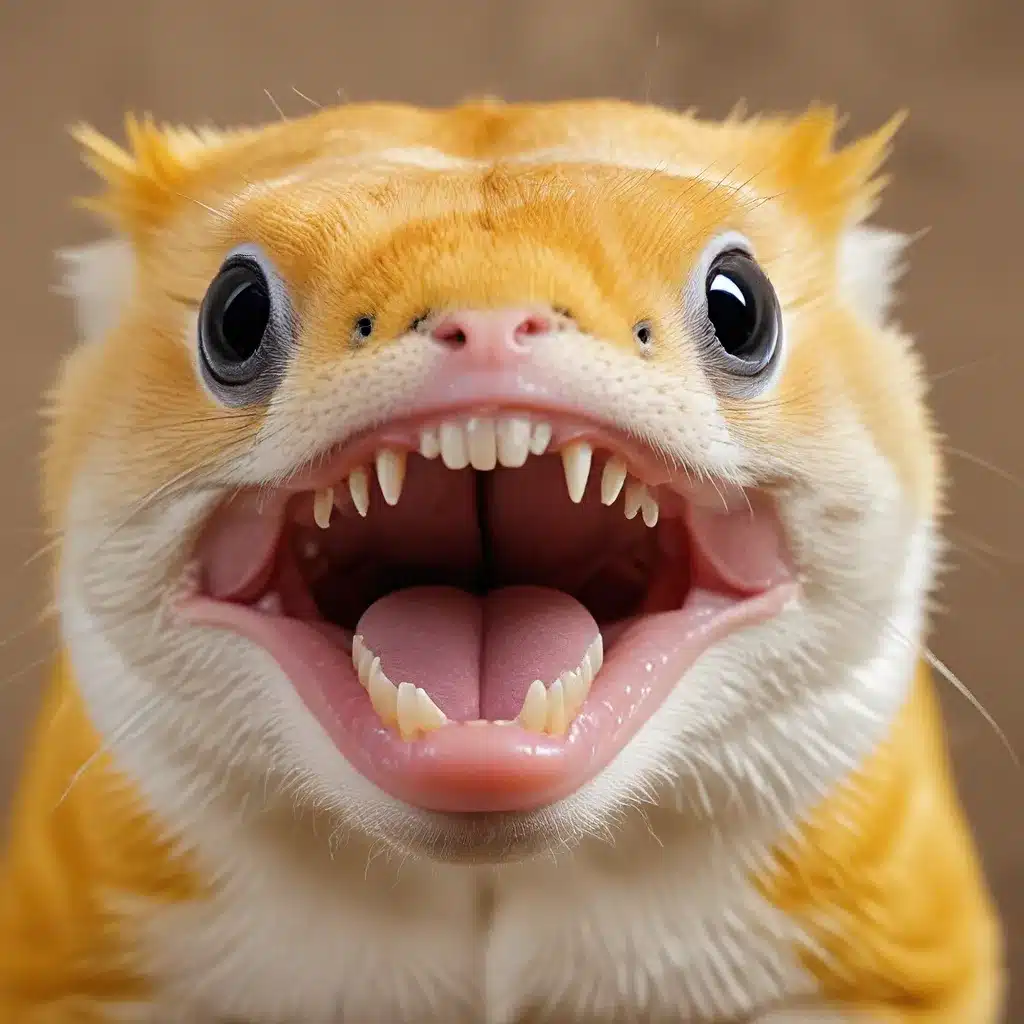
Ah, exotic pets – those furry, feathered, or scaly companions that have stolen our hearts! But did you know that these unique creatures, just like our canine and feline friends, also require meticulous dental care? That’s right, my fellow exotic pet enthusiasts, the health of your beloved critter’s pearly whites (or, well, not-so-pearly whites) is of utmost importance.
The Perils of Poor Dental Hygiene
Imagine if you never brushed your teeth. The horror! Plaque would build up, your gums would become inflamed, and you’d eventually end up with a mouthful of cavities and periodontal disease. Well, the same goes for our exotic pets. According to the American Veterinary Dental Society, a staggering 80% of dogs and 70% of cats develop dental disease by the age of three. And it’s not just our canine and feline friends who are at risk – small mammals and even some reptiles can suffer from dental woes as well.
Dental disease, the most commonly diagnosed health problem in pets, can be a real nightmare for our exotic animal companions. Imagine your beloved ferret, rabbit, or bearded dragon struggling with painful tooth issues, and you’ll understand why regular dental care is so crucial. From sharp spurs on their constantly growing teeth to tooth root infections, the consequences of neglecting your pet’s oral hygiene can be severe.
Exotic Pets and their Unique Dental Needs
While the basic principles of dental care may be the same across the board, the specific needs of our exotic pets can vary quite a bit. Let’s take a closer look at some of the unique dental considerations for different species:
Ferrets
These slinky little creatures are notorious for their love of chewing, which can lead to cracked or broken teeth. Ferrets also tend to accumulate a substantial amount of tartar along their gumlines, resulting in painful gingivitis. Regular dental cleanings under anesthesia are essential for keeping these dental dilemmas at bay.
Bearded Dragons
Believe it or not, these magnificent lizards also require preventive dental care. Unlike many other mammals, bearded dragon teeth are directly rooted into their jawbones, making them more susceptible to bone inflammation and infection. Annual dental cleanings are a must to prevent these serious issues.
Rabbits and Rodents
These fluffy friends have a unique dental trait – their teeth are open-rooted, meaning they grow continuously throughout their lifetime. This can lead to a myriad of problems, from sharp tooth spurs that can cut the gums and tongue to tooth root impaction. A balanced diet and regular veterinary check-ups are crucial for maintaining their dental health.
| Species | Unique Dental Considerations | Recommended Dental Care |
|---|---|---|
| Ferrets | – Cracked/broken teeth – Tartar buildup and gingivitis |
– Regular dental cleanings under anesthesia |
| Bearded Dragons | – Teeth directly rooted into jawbone – Susceptible to bone inflammation and infection |
– Annual dental cleanings under anesthesia |
| Rabbits and Rodents | – Open-rooted, continuously growing teeth – Sharp tooth spurs – Tooth root impaction |
– Balanced diet – Regular veterinary check-ups |
Preventing Dental Disaster: Home and Professional Care
Now, I know what you’re thinking – how the heck am I supposed to brush my ferret’s teeth or take my bearded dragon to the dentist? It may sound daunting, but with the right approach, you can keep your exotic pet’s pearly whites in tip-top shape.
Home Dental Care
For starters, brushing your pet’s teeth is a great way to maintain their oral hygiene. While it may take some practice, most exotic pets can get used to having their teeth brushed with a soft-bristled toothbrush and pet-safe toothpaste. Additionally, providing dental treats and chew toys can help keep plaque and tartar at bay.
Professional Dental Care
But even with diligent home care, your exotic pet will still need regular check-ups and cleanings by a veterinarian. These professional dental exams are crucial for detecting and treating any underlying issues, as well as performing a thorough scaling and polishing to remove built-up tartar.
According to Last Ablas Animal Hospital, exotic pets should receive an oral examination at least once a year, with some species like ferrets and bearded dragons requiring annual dental cleanings to maintain their oral health.
The Consequences of Neglecting Dental Care
I know, I know – it’s easy to get caught up in the daily chaos of caring for our exotic pets and forget about their dental needs. But trust me, the consequences of neglecting their pearly whites can be dire.
Dental disease doesn’t just make your pet’s breath stink – it can also lead to severe infections in their vital organs. The same bacteria that causes bad breath can actually poison the bloodstream, causing damage to the kidneys, liver, lungs, and heart. And without prompt detection and treatment, these internal infections can be life-threatening.
Imagine your beloved ferret or bearded dragon struggling with a fatal heart or kidney condition all because you didn’t prioritize their dental health. It’s a sobering thought, but one that highlights the importance of regular check-ups and proactive care.
Keeping Your Exotic Pet’s Smile Shining Bright
So, what’s the secret to keeping your exotic pet’s smile sparkling and their health in tip-top shape? It all boils down to a two-pronged approach: consistent home care and annual veterinary visits.
Start by brushing their teeth regularly, providing dental-friendly treats and toys, and monitoring their oral hygiene. Then, schedule a visit with your exotic pet-savvy veterinarian for a thorough check-up and professional cleaning. Trust me, your furry, feathered, or scaly companion will thank you for it!
Remember, the team at Golden Exotic Pets is always here to help you navigate the ins and outs of caring for your beloved critter. With our expert guidance and your dedication, you can ensure that your exotic pet’s smile stays radiant for years to come.

